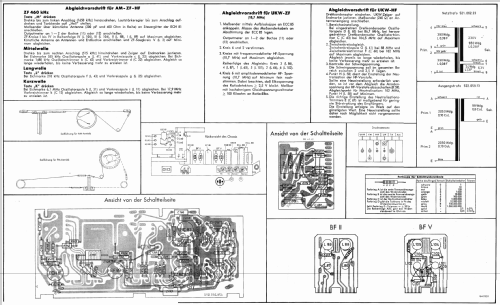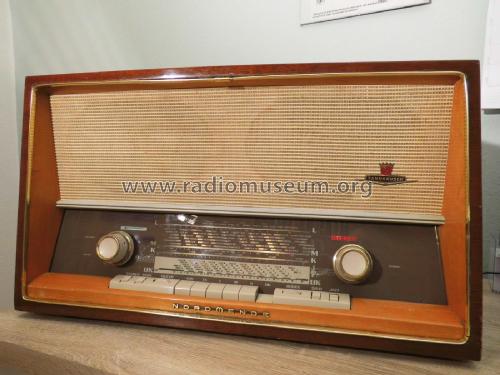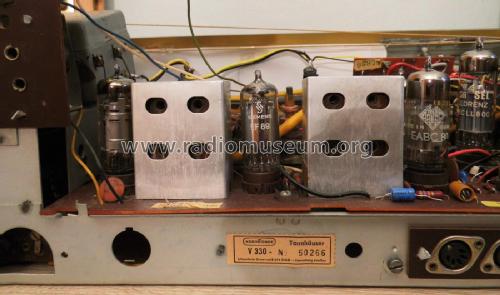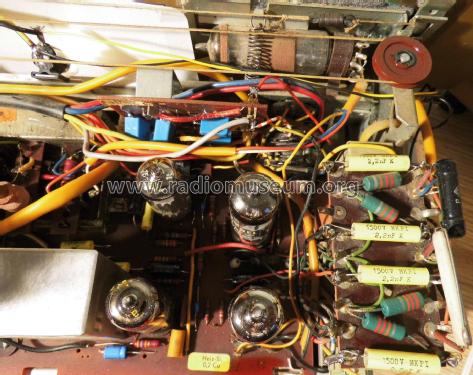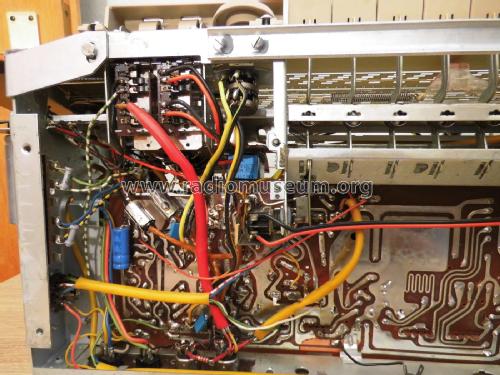Tannhäuser-Stereo V330 Ch= 4/633
Nordmende, Norddeutsche Mende-Rundfunk GmbH (Sterling), Bremen-Hemelingen
- Hersteller / Marke
- Nordmende, Norddeutsche Mende-Rundfunk GmbH (Sterling), Bremen-Hemelingen
- Jahr
- 1963/1964

- Kategorie
- Rundfunkempfänger (Radio - oder Tuner nach WW2)
- Radiomuseum.org ID
- 24761
Klicken Sie auf den Schaltplanausschnitt, um diesen kostenlos als Dokument anzufordern.
- Anzahl Röhren
- 8
- Hauptprinzip
- Superhet allgemein; ZF/IF 460/10700 kHz
- Anzahl Kreise
- 6 Kreis(e) AM 10 Kreis(e) FM
- Wellenbereiche
- Langwelle, Mittelwelle, Kurzwelle und UKW.
- Betriebsart / Volt
- Wechselstromspeisung / 110/220 Volt
- Lautsprecher
- 4 Lautsprecher
- Belastbarkeit / Leistung
- 11 W (Qualität unbekannt)
- Material
- Gerät mit Holzgehäuse
- von Radiomuseum.org
- Modell: Tannhäuser-Stereo V330 Ch= 4/633 - Nordmende, Norddeutsche Mende-
- Form
- Tischgerät, Tasten oder Druckknöpfe.
- Abmessungen (BHT)
- 570 x 335 x 255 mm / 22.4 x 13.2 x 10 inch
- Bemerkung
-
Stereo-NF-Verstärker mit 2 Gegentakt-Endstufen je 5,5 W.
Vorbereitet für den Einbau des Nordmende HF-Stereo-Decoders 563.265.29, dann zusätzliche Röhre ECC81 enthalten.
- Nettogewicht
- 12.2 kg / 26 lb 14 oz (26.872 lb)
- Originalpreis
- 482.00 DM
- Datenherkunft extern
- Erb
- Datenherkunft
- Handbuch VDRG 1963/1964
- Literaturnachweis
- -- Original-techn. papers.
- Weitere Modelle
-
Hier finden Sie 1752 Modelle, davon 1642 mit Bildern und 1270 mit Schaltbildern.
Alle gelisteten Radios usw. von Nordmende, Norddeutsche Mende-Rundfunk GmbH (Sterling), Bremen-Hemelingen
Sammlungen
Das Modell Tannhäuser-Stereo befindet sich in den Sammlungen folgender Mitglieder.
Forumsbeiträge zum Modell: Nordmende,: Tannhäuser-Stereo V330 Ch= 4/633
Threads: 1 | Posts: 2
I replaced the selenium rectifier in my Nordmende Tannhauser V330 ch=4/633 radio.I had noticed that the selenium rectifier was getting very hot.I checked on internet.Here it is indicated that selenium rectifiers have a life span of 20 years max.Over time the internal resistance goes up,causing the HT voltage to drop,the Rectifier gets more hotter as the internal resistance goes up etc.Eventually the selenium rectifier simply blows up.It is no point looking on Ebay for selenium rectifiers as these are mostly old,usually from India.
I replaced the selenium rectifier with 4 1N5404- 3 A 1000 volt units.As the HT voltage would now be around 20 volt too high,I used a small transformer,Primary 230v,secondary 20 volt.Connected the secondary winding in series with the the Tannhauser HT secondary 230 volt AC in such away to buck the 230volts from the Tannhauser HT 230 volt winding,Thus 230 volt minus 20 volt gave me 210 volts AC fed to the rectifiers to get the original + voltage.As I did not added more resistors to the HT circuit the regulation did not deterioate.
While working on the radio, a strong oschillation like cracking noise3 appeared ,removing one of the ECLL800 valves stopped it. I checked the capacitors near the end penthodes,could not see anything wrong .I knew it has something to do with the ECLL800 valve.Now just checking a capacitor with a multimeter is no prove the capacitor is good,you really have to check it with high voltage.I thought the 10nF coupling capacitor c207 connected to the anode of the triode of the ECLL800 must be faulty.I replaced it with 10nF 630 volt.Switched on and beholt everything worked.While at it ,I replaced the other 10nF capacitors.
Maurice
Maurice De Wilde, 06.Apr.16

